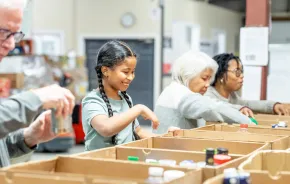 Ask yourself, does your family still remember how to play? I’m not talking about each of us glued to our own electronic devices, or going to a game or sporting event. I mean the old-fashioned kind of play. Together.
Ask yourself, does your family still remember how to play? I’m not talking about each of us glued to our own electronic devices, or going to a game or sporting event. I mean the old-fashioned kind of play. Together.
Greenspan and Wieder in their book, The Child With Special Needs, define play as how: “(to) connect, to share the pleasure of doing something together, to experience mutual joy” (without forcing interaction). Fun, joyful, spontaneous — play is an activity we do with others and without a structured purpose.
What comes to your mind when you think of play? Do you have childhood memories of moments of joy and reckless abandon with friends or family? Memories of giggling so hard it hurt? Or getting “carried away,” jointly plotting something messy or creative (but perhaps unrealistic)?
Interestingly, though children play quite naturally, they need practice. Without regular opportunities to have fun with others they lose their play skills. In schools we see many children who can “entertain themselves” (which they are good at, especially using electronics) but struggle to be able to engage in the give and take that is necessary to have fun with others.
If you are a family that is good at playing, invite other families to join you. Our community needs to build this skill and you can be a model. If playing isn’t your strong suit, here are some ideas or challenges that you can “play” with.
Take time out to play family games that aren’t competitive. Play is not about winning or losing — it is about having fun together. Keep them simple and short. Shooting hoops (no scoring). Bananagrams (no scoring). Charades. How about a scavenger hunt?
Go exploring. What happens when you go into the world with curiosity and wonder together? It can be in the woods or in the neighborhood. Can you find tadpoles today?
Be willing to be silly and/or messy. What kind of silly family rituals can you develop? How about a backwards day where dinner is for breakfast? Can you take advantage of the last day of school and institute some silly rituals? Is it fun to finger-paint on the table with shaving cream? What kind of wild and crazy ideas do you have? Kids are particularly good at dreaming up messy activities.
Plan together. Not all play needs to be completely spontaneous. At your family meeting, plan a fun activity for the week. Making banana splits and playing a game of charades?
Join with others. Invite other families to join you for a game night or an expedition of some kind. Including other kids in the max can help to ease any patterns of tension or competition that exist between sibs.
Let go of “teaching.” Not every moment has to be a “learning opportunity.” Step out of the role of parent = teacher. This only works if you let go and have fun too!
Have the courage to be imperfect. Not all planned play will be fun. Sometimes things just go amiss. Sometimes it just goes differently than planned. Hold it lightly — try again.
 About the author
About the author
Jody McVittie, MD is the executive director and cofounder of Sound Discipline, a local nonprofit dedicated to teaching people to do the right thing, even when no one is looking. Sound Discipline works with schools and families in the Puget Sound Community.












